Trusting God with Tomorrow

Introduction
In a world obsessed with planning ahead, securing the future, and forecasting every moment, Jesus’ words in Matthew 6:34 (KJV) break through like a quiet whisper of peace.
Matthew 6:34 - "Take therefore no thought for the morrow: for the morrow shall take thought for the things of itself. Sufficient unto the day is the evil thereof."
This timeless command, delivered on the hills of Galilee during the Sermon on the Mount, is more than a gentle suggestion. It is a life-altering invitation to release anxiety, embrace present grace, and trust God’s daily provision.
Are you overwhelmed by what tomorrow may bring? Do you struggle with stress, worry, or fear about the future?
If so, this Bible study will lead you through the profound spiritual truth that Jesus offered His disciples, and offers us still today.
Today we will dive deep into the original Greek meaning of the text, unpack the cultural and theological context, and explore practical applications for living a faith-filled life one day at a time.
This in-depth Bible study will increase your understanding of the verse and also nurture a quiet confidence in God’s providence.
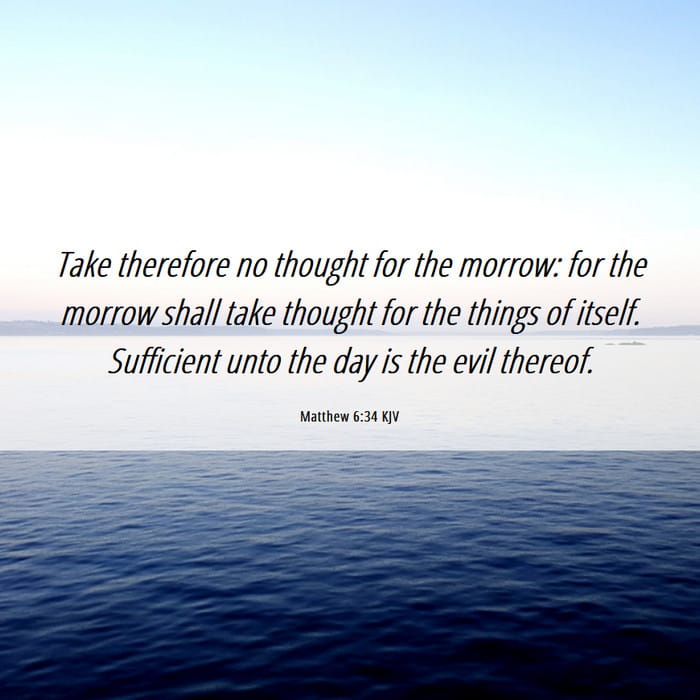
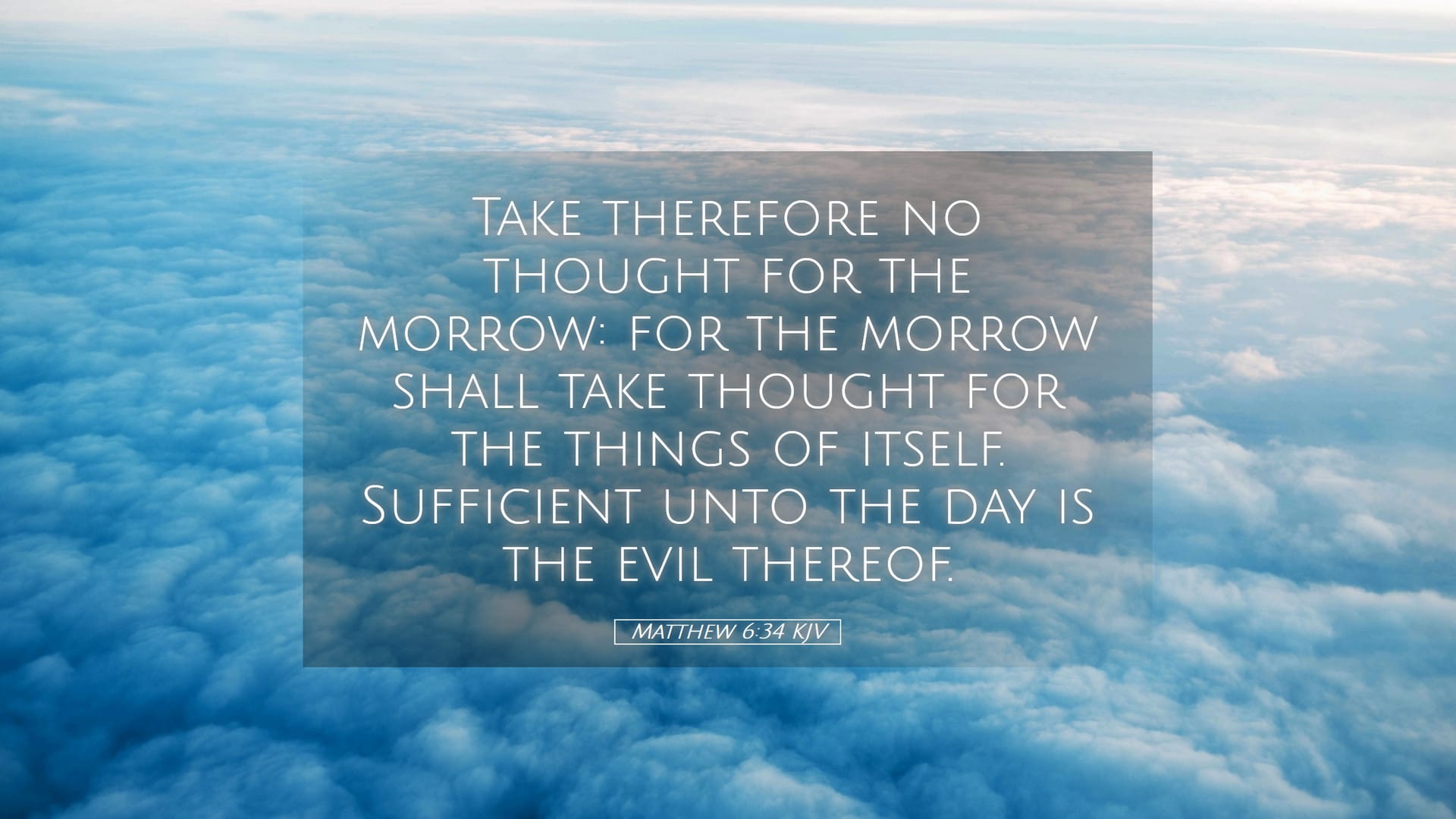
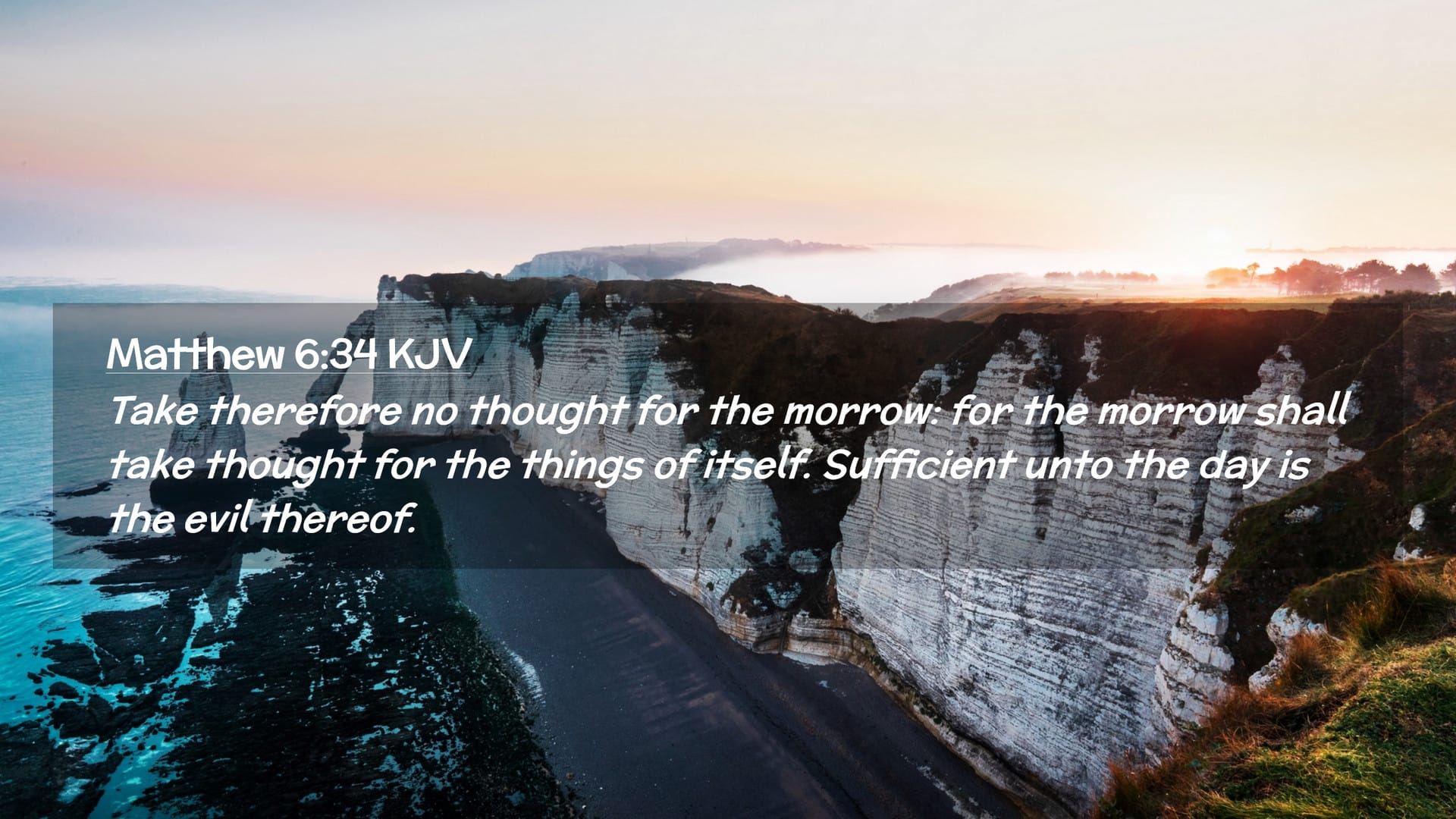
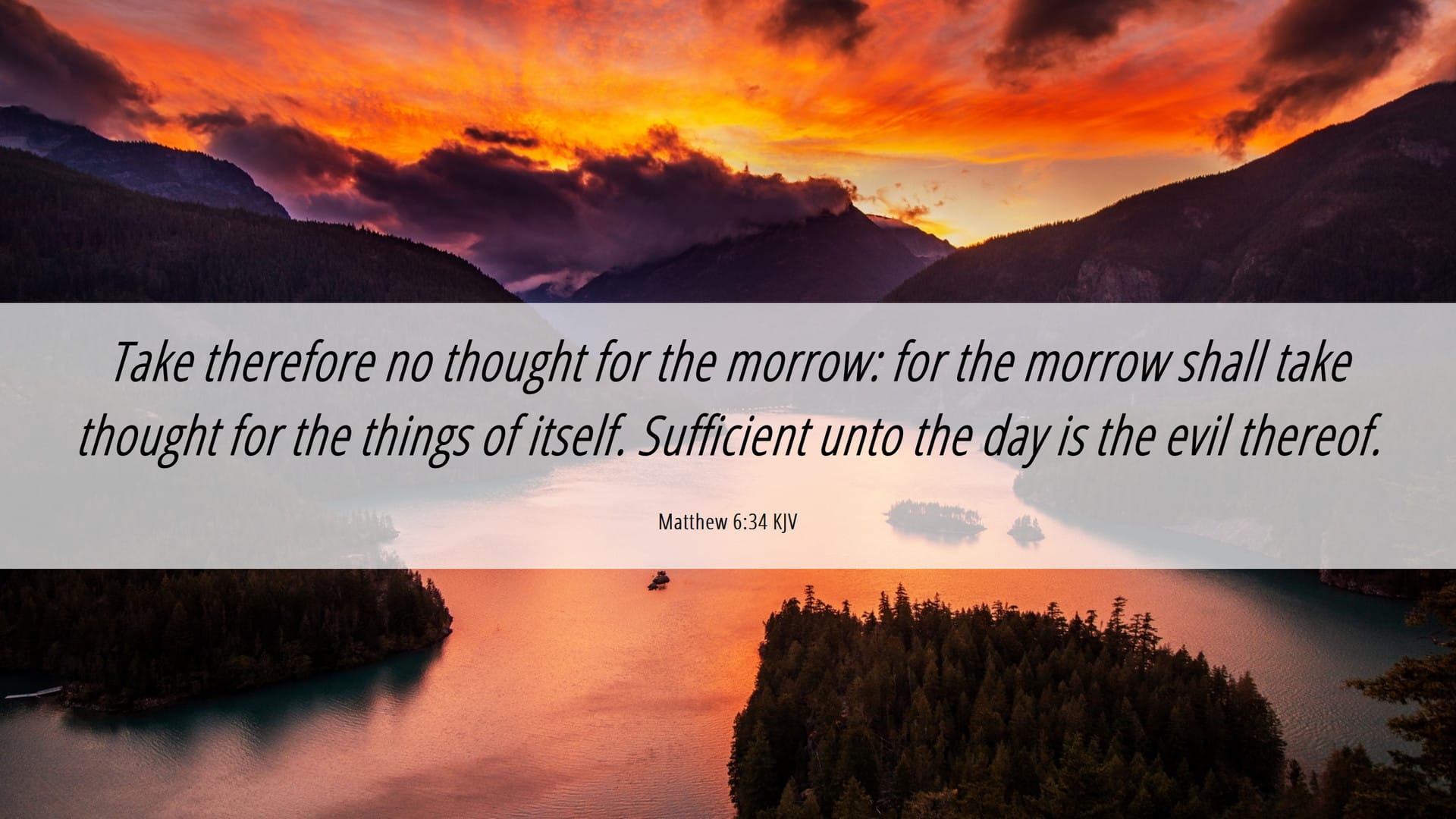
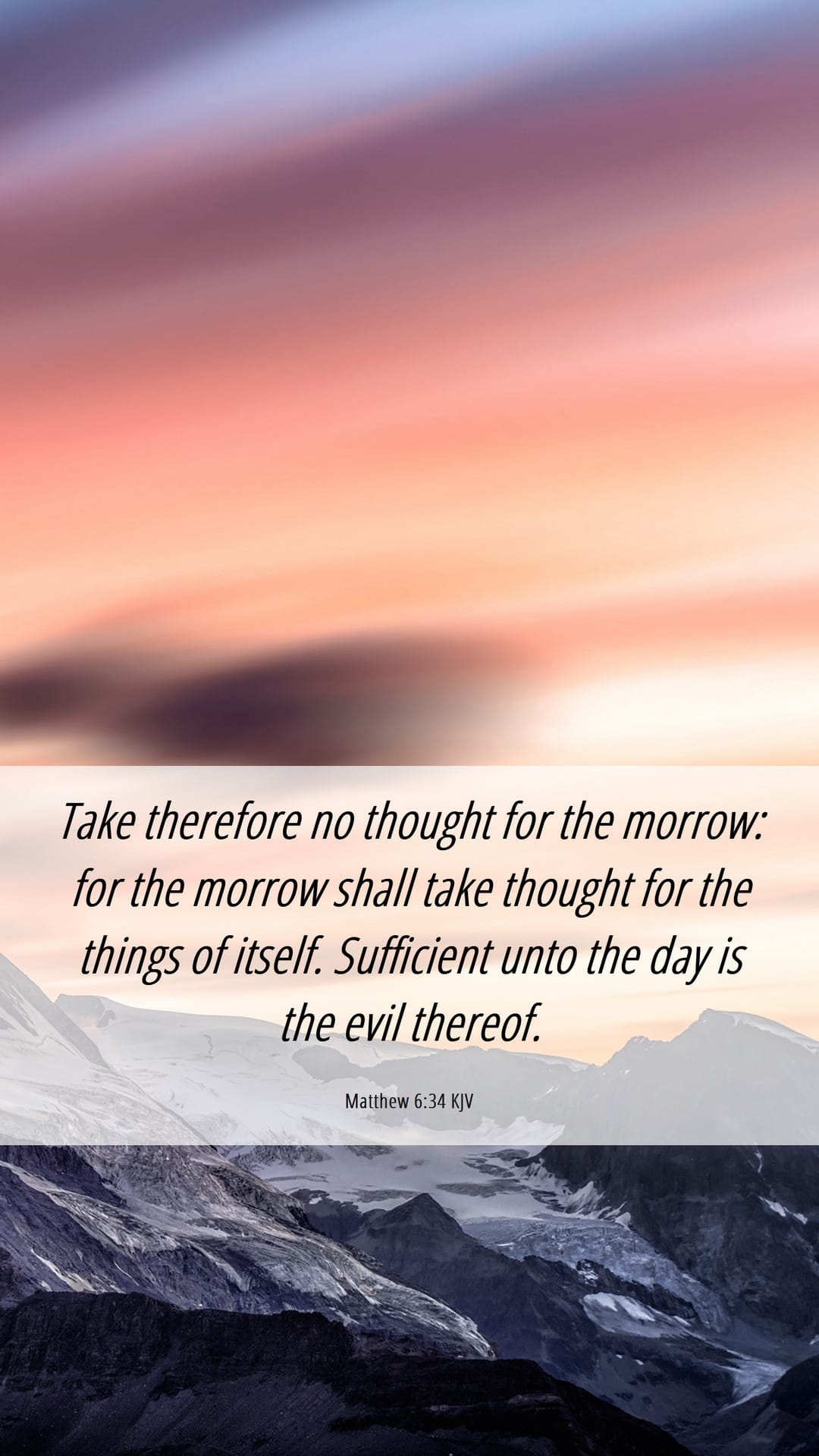
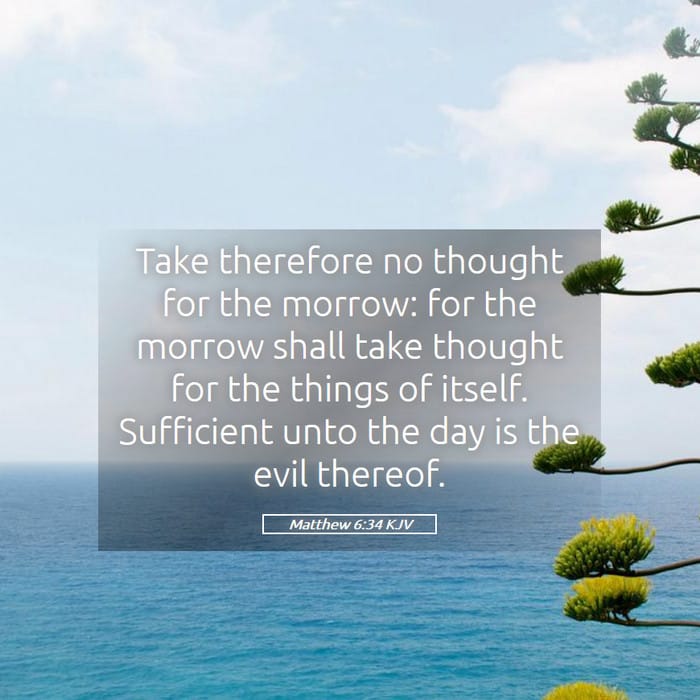

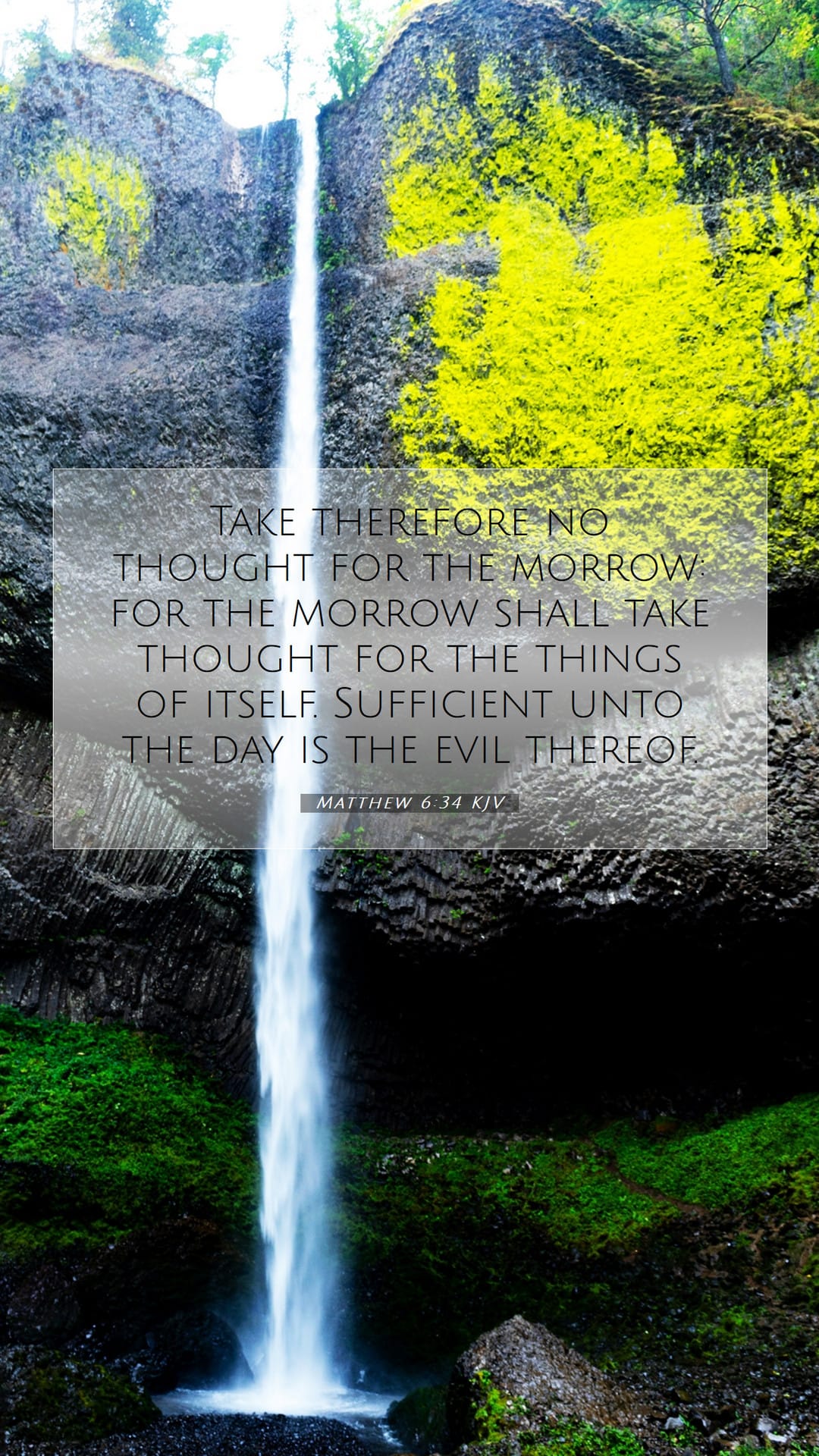
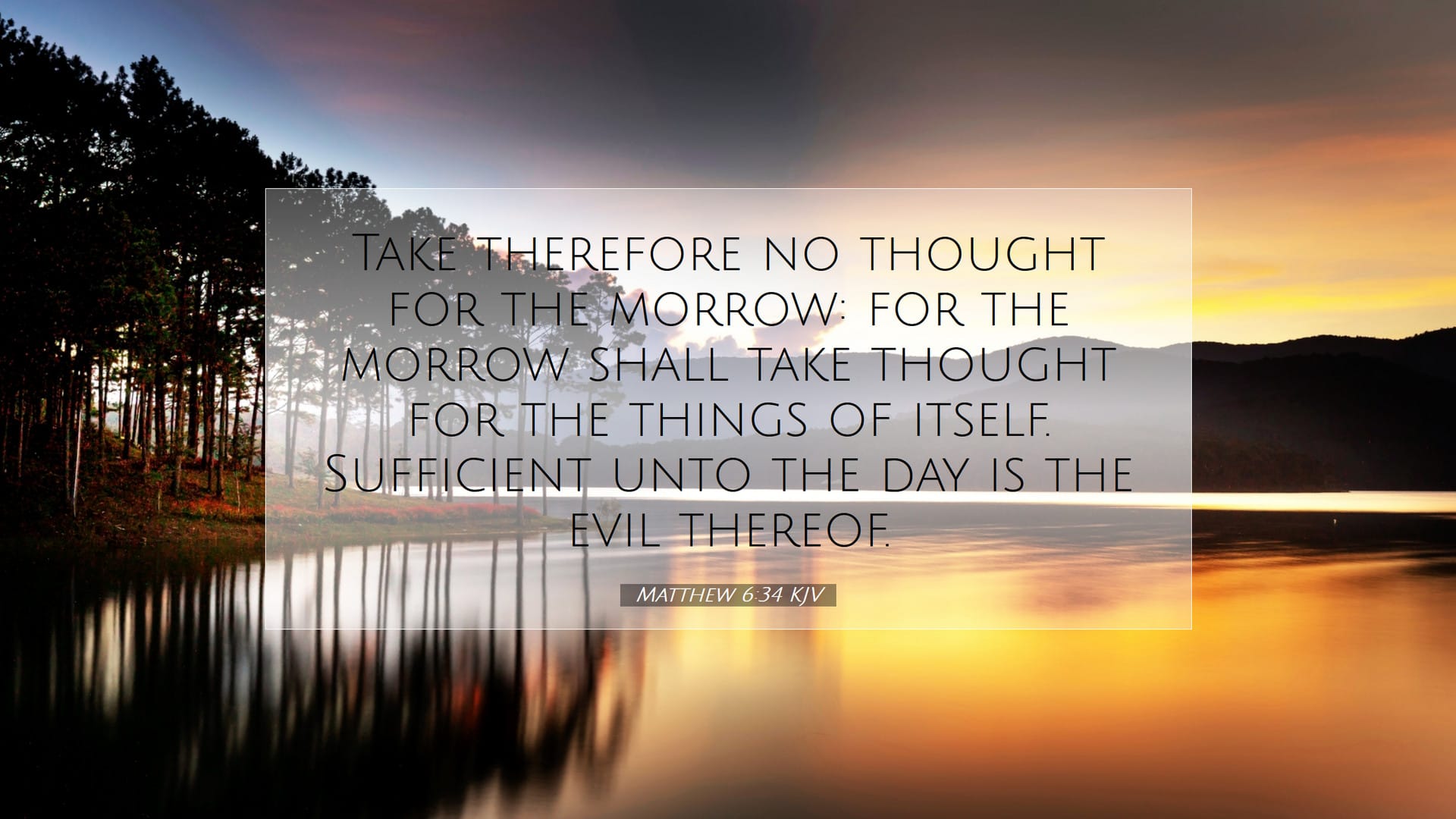
📖 Matthew 6:34 (KJV)
“Take therefore no thought for the morrow: for the morrow shall take thought for the things of itself. Sufficient unto the day is the evil thereof.”
In-depth Bible Study and Commentary
In Matthew 6:34, part of the Sermon on the Mount, Jesus addresses the human tendency to worry excessively about future events.
👉 Jesus gently admonishes us not to allow anxiety about tomorrow to distract us from living faithfully today. This verse emphasizes reliance upon God’s provision and care.
The phrase “Take therefore no thought” (meaning "do not be anxious" or "do not excessively worry") highlights trust as an essential element of faith. This is not an encouragement to carelessness but an instruction to prioritize spiritual calmness over fear-driven planning or anxious fixation on future uncertainties.
The expression, "for the morrow shall take thought for the things of itself," teaches that tomorrow is God's domain. He already knows and prepares for what lies ahead. We are encouraged to rest in the assurance of God's sovereign management of future concerns.
Jesus concludes with, "Sufficient unto the day is the evil thereof," which acknowledges that each day has its own set of challenges.
This verse invites us to face daily realities by leaning on God, dealing practically with the immediate tasks and trusting His faithfulness and sufficiency.
Supporting Cross-References
Philippians 4:6 (KJV) - “Be careful for nothing; but in every thing by prayer and supplication with thanksgiving let your requests be made known unto God.”
Commentary: Paul reinforces Jesus’ message by advising us to exchange anxiety for prayer, thus maintaining trustful communion with God.
1 Peter 5:7 (KJV) - “Casting all your care upon him; for he careth for you.”
Commentary: Peter emphasizes God’s personal care, urging us to trust God completely, knowing He deeply cares about our concerns.
Proverbs 27:1 (KJV) - “Boast not thyself of to morrow; for thou knowest not what a day may bring forth.”
Commentary: This proverb complements Jesus’ instruction, cautioning against prideful presumption and encouraging humility in accepting life's unpredictability.
Hebrew: אַל-תִּתְהַלֵּל (al-tithallel, hithpael “make yourself shine”) warns against presumptuous planning without God.
Isaiah 26:3 (KJV) - “Thou wilt keep him in perfect peace, whose mind is stayed on thee: because he trusteth in thee.”
Commentary: Isaiah highlights that peace arises from a steadfast trust in God, echoing Christ’s call to replace worry with trust.
Hebrew: שָׁלוֹם שָׁלוֹם (shalom shalom – emphatic “peace upon peace”). Trust (בָּטַח, batach) means secure confidence.
Matthew 6:27 (KJV) - “Which of you by taking thought can add one cubit unto his stature?”
Commentary: Jesus questions the practicality of worry, reinforcing the futility of anxious thinking as it accomplishes nothing constructive.

Hebrews 13:5 (KJV) - “Let your conversation be without covetousness; and be content with such things as ye have: for he hath said, I will never leave thee, nor forsake thee.”
Commentary: We are to show contentment based on God’s promise of continual presence and faithfulness.
Psalm 55:22 (KJV) - “Cast thy burden upon the LORD, and he shall sustain thee: he shall never suffer the righteous to be moved.”
Commentary: King David assures us of God’s sustaining power when we actively entrust our burdens to Him. This verse aligns perfectly with the teaching found in Matthew 6:34.
Text & Word Study
- “Take … no thought” – Greek μὴ οὖν μεριμνήσητε (mē oun merimnēsēte).
- μεριμνάω (merimnáō) means “to be drawn in different directions, to be anxious, to be distracted.” It comes from meris (“a part”) + noos (“mind”), which means a mind pulled apart. Jesus forbids the mental fragmentation that springs from obsessive worry.
- “For the morrow shall take thought of the things of itself” – Greek ἡ γὰρ αὔριον μεριμνήσει ἑαυτῆς (hē gar aurion merimnēsei heautēs).
- Tomorrow is personified; it will have its own “anxieties.” Jesus stresses the self-defeating nature of borrowing tomorrow’s load.
- “Sufficient unto the day is the evil thereof.”
- ἀρκετόν (arketon) – “enough, sufficient, adequate.”
- κακία (kakia) – in Koine can mean “evil, trouble, hardship.” The idea is “Every day already contains enough hardship to keep you prayerfully dependent.”
Literary Setting in the Sermon on the Mount
Matthew 6:25-34 forms the climactic section of Jesus’ teaching on single-hearted devotion (6:19-24). After commanding undivided treasure (verses 19-21), undivided vision (verses 22-23), and undivided service (verse 24), Jesus addresses the greatest rival to undivided trust, which is anxiety. Verse 34 is the summary imperative following two illustrations (birds/flowers) and three mini-arguments:
- God sustains lesser creatures (verses 26-30).
- Worry is unproductive (verse 27).
- Unbelief distorts priorities (verse 32).
Historical & Cultural Backdrop
First-century Galileans faced daily economic uncertainty, weather-dependent harvests, Roman taxation, and subsistence living. Jesus’ command was not given to the leisurely privileged but to laborers who genuinely wondered whether tomorrow would supply bread.
His words therefore do not encourage laziness but call listeners to reject corrosive anxiety while still engaging in obedient labor.
Theology of Divine Providence
Jesus roots freedom from worry in the Father’s providence (πρόνοια, pronoia – “fore-thought,” though the NT term itself appears in Acts 24:2). Scripture consistently portrays God as:
- All-knowing – tomorrow is never future to Him (Isa 46:10).
- Sovereign – He actively orchestrates events for good (Rom 8:28).
- Benevolent – “How much more shall your Father…?” (Matt 7:11).

Exegetical Movement of the Verse
- Imperative – Stop letting anxiety rule.
- Ground (γάρ) – Tomorrow will merimnáō for itself; your worry changes nothing.
- Reassurance – Today’s hardships are arketon (“enough”). God will give today’s matching grace (Lamentations 3:22-23).
Canonical Trajectory
- Genesis 22 – Abraham’s willingness to sacrifice Isaac shows lived faith that “God will see/provide” (יִרְאֶה, yir’eh).
- Exodus 16 – Daily manna regulated to one day’s supply inculcated reliance.
- Lamentations 3:22-23 – New mercies “every morning” reinforce the day-by-day rhythm that Jesus commands.
Jesus carries this line to its fullest intensity: trust your Father today; let tomorrow’s mercies meet tomorrow’s needs.
Practical Application
- Spiritual Discipline of Present-mindedness – cultivate meditation and gratitude that anchor attention in God’s present grace.
- Prayer as Transfer – translate every arising anxiety into explicit petition (Philippians 4:6).
- Vocational Faithfulness – plan responsibly but refuse panic; diligence is commanded, dread is forbidden (Proverbs 31:25).
- Witness to an Anxious Culture – peace amid uncertainty advertises the Gospel’s reality.

Reflection
John Newton wrote, “Each day has its own mercy and trial; we need daily bread.” Matthew 6:34 invites believers to step off the treadmill of “what-ifs” and onto the pathway of relational trust.
God’s compassionate omniscience stands guard over every unseen tomorrow; therefore, with μεριμνάω subdued and shalom shalom enthroned, we as disciples and followers of Jesus Christ can labor, rest, and worship, one grace-filled day at a time.
Conclusion: One Day, One Grace, One God
To recap, in a world weighed down by uncertainty, Matthew 6:34 rises like a beacon of divine reassurance: “Take therefore no thought for the morrow…”
Jesus does not offer empty optimism. He offers eternal truth grounded in the character of a faithful God.
He calls us not to ignore the future but to entrust it entirely into the hands of the One who already holds it.
The original Greek reveals more than just a warning against worry, it unveils a radical invitation to live whole-heartedly in the present, anchored in divine provision.
👉 Every moment of anxiety about tomorrow is an opportunity to return to the simple, powerful truth: God is enough for today, and He will still be enough tomorrow.
Each day brings its own set of challenges (“sufficient unto the day is the evil thereof”), but each day also brings a fresh outpouring of mercy (Lamentations 3:23).
You were not created to carry the weight of a thousand tomorrows. You were called to walk with God today.
So breathe deeply, rest securely, and cast every care upon the Lord, not because tomorrow will be easy, but because He will still be God.
🙏 Final Encouragement
Whatever tomorrow holds, it is already held by God. As you meditate on Matthew 6:34, may your heart be lifted from fear to faith, from anxiety to assurance, from distraction to devotion.
Live today. Trust for tomorrow. God is already there.
You might be reading this after losing your job, battling depression or health issues, caring for a sick loved one, or walking through unspeakable grief.
Maybe you don’t know what tomorrow holds, or if you can even survive it. Maybe the idea of “prayer” feels distant, or even painful, because you don’t have the strength or the words.
👉 But here’s the truth: God is not looking for perfect prayers ... He’s looking for surrendered hearts.
Even when you cannot form a sentence, He hears your sighs (Psalm 38:9).
Even when all you can do is cry, He collects every tear (Psalm 56:8).
If faith feels like a flickering flame, He will not snuff it out (Isaiah 42:3).
Your weakness is not a barrier, it’s an invitation for Him to show Himself strong.
Let this be your prayer and your posture:
“Lord, I surrender tomorrow to You. Let me trust, obey, and walk with You today, one grace-filled moment at a time.”